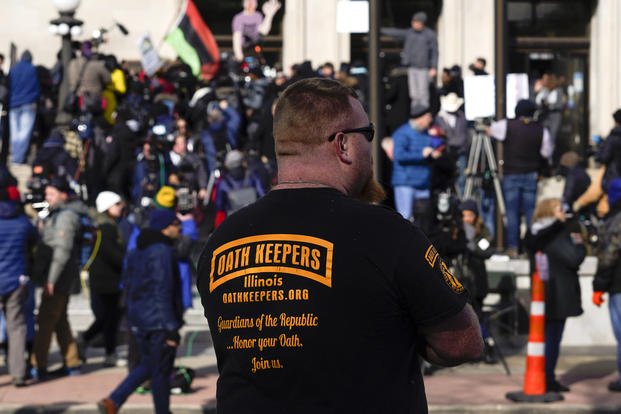A new study by Rand Corp. has found a much smaller number of veterans, compared to the general population, say they believe in white supremacy, the QAnon conspiracy theory and left-wing extremism.
But nearly 18% of veterans did agree with the idea that Americans may have to resort to violence because the country has gone in a direction they don't support, according to a survey of about 1,000. The think tank also found that 28% agreed with the Great Replacement Theory, a cornerstone of racist ideology that claims powerful elites are trying to replace native-born Americans with immigrants and people of color who share their political beliefs.
The theory is also referenced by the far-right as "white genocide."
Read Next: B-2 Stealth Bombers Flying Again, But Air Force Still Mum on Reason for Grounding
The data from Rand highlights a troubling trend among veterans, who in recent years have often been involved in domestic terrorism and other far right-related crimes. The study found that veterans might be slightly less likely to align with radical viewpoints when compared to polls done on the general public, though the data on the subject is minimal and not directly comparable.
Extremist groups such as the Oath Keepers -- the group's former leader and members were convicted of seditious conspiracy for their role in the Jan. 6 insurrection -- have also preyed on troops and those who leave the service, hoping to benefit from their status and military know-how.
"My biggest concern is this study provides a lot of data but stimulates a lot of questions. What we're focused on is the transition; the research shows that's a vulnerable period for substance abuse, homelessness and other issues," Rajeev Ramchand, a researcher who wrote the report, told Military.com. "This highlights there are other groups who are bad actors trying to recruit into their groups. If a group comes to them and offers camaraderie, that to me is concerning."
Veterans represent about 7% of the U.S. population, according to the Census Bureau, yet veterans were behind 10% of all domestic terror attacks between 2015 and 2021, according to recent expert testimony before the House Veterans' Affairs Committee.
There is scant data on whether military service drives anyone toward radical ideologies, but extremist groups are attracted to service members and veterans for their knowledge of weapons and logistics, and inherent social credibility that can bring in more recruits.
Despite the interest and recruiting from extremist groups, Rand said it found evidence that fewer veterans expressed support for extremist groups such as the Proud Boys, which also had members convicted of seditious conspiracy for their role on Jan. 6, as well as the politically liberal extremist group Antifa and the QAnon conspiracy theory, which claims the government, financial world and media are run by a group of Satan-worshiping pedophiles who operate a global sex trafficking ring.
"On the one hand, these results are encouraging," according to the Rand report.
However, the survey data does not include more in-depth information such as interviews that could explain the findings. "It is difficult to interpret the reasons for these lower figures for veterans," the report found.
"Most military veterans are seeing the best in America and are not so far down the rabbit hole [joining] extremist organizations or ideologies," Ellen Gustafson, co-executive director of We the Veterans, a nonpartisan group that organizes veterans to work in elections, including operating polling stations, told reporters at a Monday press conference.
Veterans in the Proud Boys and Oath Keepers were among the throngs of rioters who smashed windows, fought police and broke into the U.S. Capitol during the violent Jan. 6, 2021, insurrection, which was egged on by then-President Donald Trump as an effort to stop Congress from certifying President Joe Biden's election win.
The Oath Keepers stockpiled weapons at a nearby hotel for a planned insurgency, fighting police and National Guardsmen in the streets of Washington, D.C., and neighboring Virginia. That group's founder, Stewart Rhodes, who served a short stint in the Army, and several of his followers were handed very rare convictions on sedition charges.
Veterans and members of the military have been key members of extremist movements for decades. Louis Beam, who was a helicopter door-gunner in Vietnam, became a klansman after the war and led the Texas Emergency Reserve, a militia that at its peak had more than 2,000 members and threatened violence against Vietnamese fishermen who had immigrated to the state. Beam went on to write Essays of a Klansman, arguing that the preservation of the white race required terror attacks within the U.S.
Most infamously, Timothy McVeigh, an Army veteran who had served in Operation Desert Storm, perpetrated the 1995 Oklahoma City bombing, which killed 168 people and injured nearly 700 others.
Meanwhile, the Great Replacement Theory played a central role in the Unite the Right rally in Charlottesville, Virginia, in 2017. There, white supremacists and alt-right groups including neo-Nazis, Confederate sympathizers, klansmen and Proud Boys marched at the University of Virginia with tiki torches chanting "Jews will not replace us," protesting the planned removal of a Robert E. Lee statue.
-- Steve Beynon can be reached at Steve.Beynon@military.com. Follow him on Twitter @StevenBeynon.












